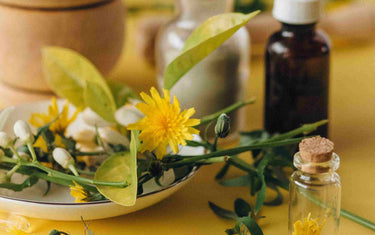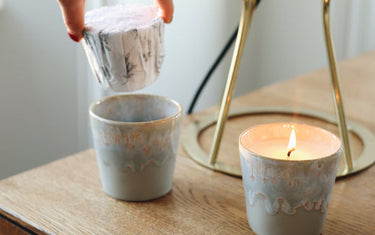4 min read / 23 February 2023 / Laura Garvin Gomez
Organic vs Convential Oils: Are Organic Essential Oils Better?
The word 'organic' may sound flashy and beneficial, but what does it actually mean?

When shopping at a local supermarket, we're likely to be drawn to the selection of organically sourced produce.
Essential oils, like food, have organic varieties too - so why aren't they talked about as much? What's the difference between your standard, conventional bottle of aromatherapy and those with a shiny organic label on them?
While the answer may be obvious at first, essential oils aren't quite as plain and simple as food. There are many factors that could constitute splurging on an organic oil, and some others that maybe don't.
We'll be detailing all you need to know about organic oils, what they are, and whether they're worth adding to your wellness collection.

What does "organic" really mean?
The term "organic" refers to any fruits, vegetables, animal products, or cosmetics that meet the appropriate quality measured by a certification board.
Certain elements that may qualify a product as organic include:
- The soil the product is grown in
- The avoided use of particular chemical substances like pesticides
- Minimised contact between organic and non-organic crops
- The avoided use of synthetics throughout manufacture
Organic products are generally viewed as the more sustainable option due to these factors. All essential oils that are marked as organic in the UK are certified via the Soil Association.
What's the difference between organic and non organic essential oils?
Organic essential oils have been confirmed free of chemicals and synthetics by a relevant certification board, such as the Soil Association.
They are grown in the most sustainable, environmentally friendly way possible, and tend to produce slightly crisper aromas as a result. They may also carry more potent benefits thanks to their heightened active constituent levels.
Conventional essential oils don't have these confirmed certifications, but that doesn't mean they should be entirely overlooked.
Firstly, the observed quality of an organic essential oil can make it much more expensive, which may not be ideal if you're looking to harness the powers of aromatherapy on a budget.
There's also nothing to say that conventional oils don't share the same practices that organic ones do.
While it may not always be confirmed by a board, many essential oil farms around the globe utilise organic practices as standard, meaning there's good chance your oils are already doing their bit for the planet.

Are organic essential oils better?
Many people believe that organic essential oils carry less of a risk of pesticide contamination.
While this is certainly true, the chances of a conventional essential oil having any pesticides are also pretty slim.
For starters, many of the crops that are used to make essential oils - like rosemary, citronella, lavender, and clove - are already master repellents against garden insects, so don't often require a chemical spray in the first place.
Essential oils are also commonly steam distilled, which is the process whereby steam is used to detach the plant material from its volatile compounds.
Generally, pesticides have molecules that are simply too large to be picked up by the steam. They also don't do well under extreme temperature conditions, so are usually broken down before the oil is ready to be extracted.
The only risk of contamination across conventional oils comes from those that are cold pressed instead of steam distilled. This process involves pressing the botanical (usually a citrus fruit) until the oil sacs burst and are ready for collection.
As there is no heat process involved in extracting these oils, the possibility of a pesticide ending up in your final bottle rises slightly. Even so, the chances of your essential oil exceeding recommended exposure levels is extraordinarily rare.

So, are organics worth the hype? If you want to be sure of the quality and environmental impact of your essential oils, then yes, it's certainly worth spending a little more money for greater peace of mind.
That being said, the chances of a conventional essential oil containing any nasties to begin with are super slim, so there's no reason to feel pressured into making the switch for the benefit of your health.
Ultimately, the choice to buy an organic essential oil over a conventional one falls entirely on personal preferences, tastes, and values.
Those that practise aromatherapy often through inhalation or topical application may feel more assured by the change, while those that focus more on using essential oils for candles or other crafts may not worry about the certification so heavily.
Whichever way you choose, essential oils are guaranteed to add greater benefits to your wellness routine overall.
If you're wanting to properly identify an organic essential oil in the UK, always look out for the Soil Association symbol.










